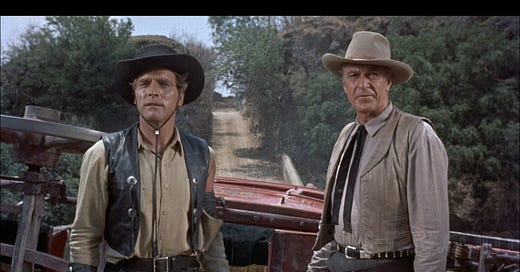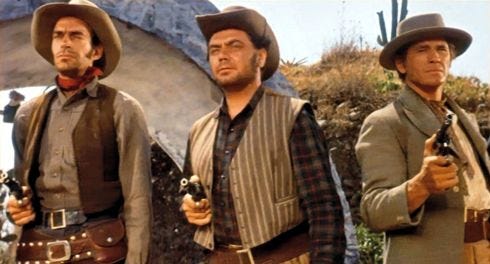Reeling Backward: Vera Cruz (1954)
Coop and Lancaster stand out in this lesser known but influential Western about two gunmen seeking their fortune in revolutionary Mexico who become friends... for a time.
Thanks for reading! Please consider supporting Film Yap with a paid subscription for access to premium content plus exclusive opportunities!
“Vera Cruz” stands out for scraping bottom.
This 1954 Western starring Gary Cooper and Burt Lancaster startled audiences of its day for its hard-bitten approach to violence and sneering take on the iconography of the cowboy. It’s about American gunmen who go south after the Civil War as hired mercenaries looking to make a buck during the Juarista uprising in Mexico against the French-Austrian occupation.
There are a couple of attempted rapes, men gunned down for failing to knuckle under, physical abuse of women, and at one point the Americans take some Mexican children hostage and threaten to kill them unless their revolutionary antagonists back off.
Tough stuff.
When someone asks Coop’s character if they really would have murdered innocent children, he sort of shrugs it off and acknowledges it as a distinct possibility had things not gone their way.
The film has seen its place recede in the public consciousness to the point it’s nearly a forgotten film. But it was highly influential on a number of later movies, especially “The Wild Bunch” as well as “The Magnificent Seven.” Even the 1986 comedy “Three Amigos” — a personal favorite — is seen as a spoof.
The movie, directed by journeyman Robert Aldrich (“The Dirty Dozen”) from a script by Roland Kibbee and James R. Webb (“How the West Was Won”), story by Borden Chase (“Red River”), is out now in a terrific Blu-ray reissue from Kino Lorber.
Aldrich and Lancaster had just made another film together, “Apache,” in which he played a Native American warrior who spurns resettlement to stake his own piece of land. (Lamentable, but ‘twas the practice at the time…)
“Vera Cruz” was also notable for featuring a number of distinct character actors like Jack Elam, George Macready and Jack Lambert. Ernest Borgnine and Charles Bronson turn up in early roles before they became stars, playing especially brutish members of the American gang named Donnegan and Pittsburgh, respectively.
Lancaster plays Joe Erin, a notorious black hat leading a group of other criminals south. He seems to have a perpetually dirty face and tousled hair the entire movie, a man who guzzles wine and gnaws on a turkey leg, taking pride in his slovenly ways. He has a leering smile that he usually turns on right about the time he’s about to plug somebody — followed by a fancy twirl and re-holstering of his shootin’ iron.
He meets up with Ben Trane (Cooper), a former Confederate colonel from New Orleans, when the latter’s horse turns up lame at a tiny outpost. Erin sells Trane another horse for a hard $100 in gold, not bothering to tell him it’s not actually his to sell. After being chased down by royal lancers and having a scuffle, the two men decide to throw in together.
Both are excellent marksmen with the fancy new Winchester repeating rifles, along with the ubiquitous quick-draw six-shooters. Trane is taciturn and dignified, only wanting to make some cash so he can restore his plantation burned down by the Yankees, while Erin is a self-confessed pig who always wants more, more, more.
The Americans don’t have any particular preference for whether to side with the French empire led by Emperor Maximilian (Macready) or the Juaristas led by General Ramirez (Morris Ankrum). But the French are offering gold while the rebels can only offer a cause, so it’s a quick choice.
Trane and Erin have an interesting, tense relationship. There seems to be some genuine affection and respect between them in an opposites-attract sort of way. But it seems clear from the outset they will eventually betray one another, and they’re just biding their time until their final, inevitable confrontation.
Erin repeatedly references the lessons of his tutor, Ace Hanna, an immoral gambler who killed his father and then took him in as a boy. Erin learned well at his knee — trust no one, take no chances you don’t have to, always play the odds, etc. — and completed his apprenticeship by killing Hanna.
He accuses Trane of having a soft spot, saying you can’t fully trust a man like that. For his part Trane tries to steer the gang away from its worst impulses, including standing up to the hooligans when they assault Nina (Sarita Montiel), a winsome young tag-along who secretly is a Juarista spy.
Trane, who is portrayed with some of the mislaid romanticism for Confederate soldiers of the time, sympathizes with the upstarts but follows Erin’s lead in signing up with Maximilian. He enjoys an ongoing flirtation with Nina, an expert pickpocket who keeps stealing and returning his leather wallet.
Their assignment is to escort French Countess Marie Duvarre (Denise Darcel) to the titular city to take ship back to Europe, for a cool fee of $50,000. Also accompanying them is a pompous aristocrat, Marquis Henri de Labordere (Cesar Romero), who has a notion of romancing the countess, and a company of lancers led by Captain Danette (Henry Brandon), who wears a militant disposition, slicked hair and a monocle, and would seem to be a stand-in for a Nazi-esque figure.
Trane and Erin take pleasure in mocking the latter to his face, and the former behind his back, referring to the Marquis as “Old Crocodile Teeth” for his constant, false smile masking his true nefarious intentions. (Though Erin could be a cousin.)
They quickly sniff out the real purpose of the enterprise: to smuggle $3 million in gold coins hidden in the countess’ gilded coach to purchase arms and mercenaries from Europe to bolster the false emperor’s flagging position. She, Trane and Erin soon hatch a plan to split the money three ways, though it’s clear each has aspirations to whittle the split down to two, and then to one.
So it’s a decidedly cynical tale. Most everyone we meet is a violent sociopath, a double-crosser or a defender of autocratic usurpers.
Aldritch and his cinematogrpher, the great Ernest Laszlo, come up with some pretty startling shots you don’t expect to see in a fleshy, gunfire-filled flick. At one point they shoot over Lancaster’s shoulder as he does nearly a 360-degree turn to look at the army of peasant soldiers who suddenly surround them.
The story ends where we know it must: with Erin finally doing something so black-hearted that Trane can no longer led it slide, finally choosing doing the right thing over chasing the tainted gold.
“Vera Cruz” isn’t a great film, but it deserves a bigger spot in the cinematic pantheon than it’s been accorded. It wasn’t until the following decade that people started talking about “revisionist Westerns,” but here’s an early, important figure in that film family tree.






